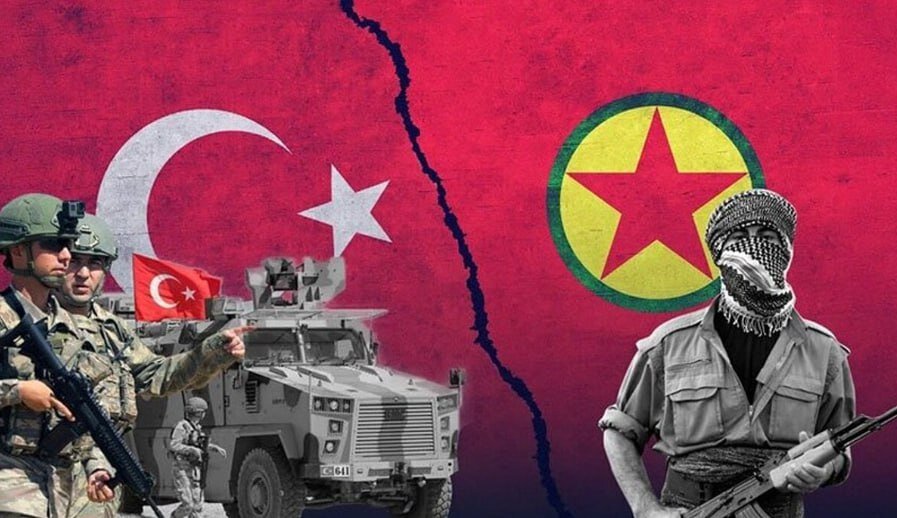PKK’s historic shift: From insurgency to politics and regional outcomes

TEHRAN – The Kurdistan Workers’ Party (PKK) has announced its disbandment, marking a significant shift in Middle Eastern geopolitics with major effects on Turkey, Iran, Iraq, and Syria. Designated a terrorist group by Turkey, the U.S., and the EU, the PKK waged a four-decade insurgency seeking Kurdish independence.
Following a February 2025 call from its imprisoned leader Abdullah Ocalan, the group decided to cease armed struggle and dissolve. While this move raises cautious hope for peace, uncertainties about lasting stability remain.
The PKK’s decision and its context
The PKK has said it was going to cease its existence from the 12th Congress that took place in northern Iraq, and has chosen to stop armed struggle and to become a political movement after many years of fighting that have claimed the lives of more than 40,000 people.
News organization Firat News Agency said this change was inspired by a plea issued in February from imprisoned leader Ocalan that peaceful methods should meet the Kurds’ new demands.
The organization that has always fought for an independent Kurdish state, in recent years, has been focusing on autonomy and cultural rights within Turkey; however, their use of violence has been the cause of Turkey, the US, and the EU to name them terrorists.
The PKK's decision followed a variety of issues, such as recent Turkish military pressure and changes of regional alliances, although indeed all of those had been preceded by a unilateral ceasefire in March 2025.
Implications for Turkey and the region
Turkish President Recep Tayyip Erdogan hailed the PKK’s decision as a "critical threshold" toward a "terror-free Turkey," though he emphasized that the disbandment must extend to all PKK affiliates in Iraq, Syria, and Europe.
The move could enable political reforms for Turkey’s Kurdish minority, which constitutes roughly 20% of the population, and reduce tensions in northern Syria, where Turkish forces have clashed with PKK-linked Kurdish militias.
However, skepticism persists: Turkish Foreign Minister Hakan Fidan noted that the government would monitor the group’s compliance, signaling that trust remains fragile.
In Iraq and Syria, the PKK’s dissolution may reshape local power dynamics. Iraqi Kurdish leaders, who have long balanced cooperation with Turkey against solidarity with Kurdish causes, could face pressure to distance themselves from residual PKK elements.
In Syria, the U.S.-backed Syrian Democratic Forces (SDF), which include PKK-aligned units, may need to recalibrate their strategy amid Turkish demands for demilitarization.
Iran welcomes the PKK's dissolution as a regional security gain
Iran, which shares a border with Turkey and hosts its own Kurdish minority, welcomed the PKK’s disbandment as a positive development for regional security. Foreign Ministry spokesperson Esmaeil Baghaei stated that Iran views the move as "an important step toward rejecting violence and strengthening security," expressing hope that it would foster stability in Turkey and the broader region.
This stance aligns with Iran's broader strategic interests in maintaining stability along its western borders. The disbandment of the PKK reduces the potential for cross-border insurgencies and contributes to a more secure environment in the region.
Implications for regional peace and stability
The PKK’s dissolution marks a critical juncture with significant implications for regional stability and peace in the Middle East. Particularly in northern Iraq, where the PKK maintained longstanding bases, a structured disarmament process is expected to begin, supervised by intelligence agencies from Turkey, Iraq, and Syria.
This process will involve cataloging weapons and organizing their surrender, aiming to reduce armed conflict in the region.
Beyond security, the disbandment opens avenues for economic development in conflict-affected Kurdish areas. Turkey may prioritize integrating these regions into national development plans, while Iran could leverage the opportunity to strengthen cross-border economic cooperation, fostering broader regional collaboration.
However, challenges remain. Doubts persist regarding the full disarmament of PKK fighters and their reintegration into society. The risk of splinter groups continuing armed resistance cannot be ignored. Moreover, Turkey’s complex political environment-with ongoing restrictions on pro-Kurdish parties and opposition arrests-raises concerns about the inclusivity of the peace process.
Despite these obstacles, the PKK's disbandment offers a rare chance for de-escalation and regional cooperation. For Iran, a more stable western border enhances national security and economic ties.
Success will depend on effective disarmament, inclusive political dialogue, and sustained international support for transparent peace-building that prioritizes minority rights and long-term conflict resolution.
Leave a Comment